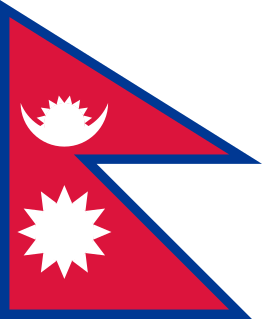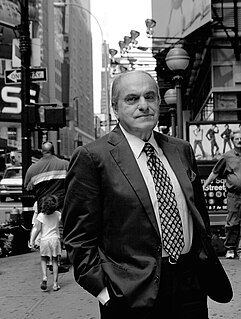
The Council on Foreign Relations (CFR), founded in 1921, is a United States nonprofit think tank specializing in U.S. foreign policy and international affairs. It is headquartered in New York City, with an additional office in Washington, D.C. Its membership, which numbers 4,900, has included senior politicians, more than a dozen secretaries of state, CIA directors, bankers, lawyers, professors, and senior media figures.

Pushpa Kamal Dahal, also known as Prachanda, is a Nepalese politician and one of the two chairmen of the Nepal Communist Party, formed by the union of Communist Party of Nepal and Communist Party of Nepal (Maoist-Centre). He was the Prime Minister of Nepal from 2008 to 2009 and again from 2016 to 2017.

The Communist Party of Nepal was a communist political party in Nepal.

Buddhism in Nepal started spreading since the reign of Ashoka through Indian and Tibetan missionaries. The Kiratas were the first people in Nepal who embraced Gautama Buddha’s teachings, followed by the Licchavis and Newars. Buddha was born in Lumbini in the Shakya Kingdom. Lumbini is considered to lie in present-day Rupandehi district, Lumbini zone of Nepal. Buddhism is the second-largest religion in Nepal. According to 2011 census, the Buddhist population in Nepal is 9% of the country population. It has not been possible to assign with certainty the year in which Prince Siddhartha, the birth name of the Buddha, was born, it is usually placed at around 563 BCE. According to 2001 census, 10.74% of Nepal's population practice Buddhism, consisting mainly of Tibeto-Burman-speaking ethnicities, the Newar. In Nepal's hill and mountain regions Hinduism has absorbed Buddhist tenets to such an extent that in many cases they have shared deities as well as temples. For instance, the Muktinath Temple is sacred and a common house of worship for both Hindus and Buddhists.
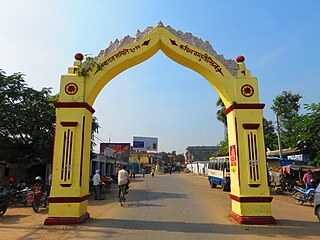
Taulihawa, also known as Kapilavastu, is a municipality and administrative center of Kapilvastu District in Province No. 5 of southern Nepal. Taulihawa is located roughly 25 kilometres (16 mi) to the south-west of Lumbini, a UNESCO World Heritage Site and the birthplace of Gautama Buddha.

Lumbini was one of the fourteen zones of Nepal until the restruction of zones to Provinces. It is home to the Lumbini site, the birthplace of Siddhartha Gautama, who later became the historical Buddha and founder of the Buddhist philosophy. The zone's headquarters was Butwal.
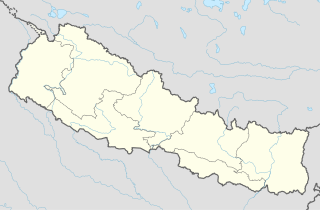
Siddharthanagar municipality is the administrative headquarter of Rupandehi District on the Outer Terai plains of Nepal, 265 km (165 mi) west of Kathmandu Nepal's capital. It is also the "Gateway of Lumbini." Lumbini, the birthplace of Gautama Buddha is 25 km to the west. Butwal is the nearest city around 21 km from Bhairahawa making the two major cities of the Butwal - Bhairahawa corridor.It borders India, Sonauli in Maharajganj district of Uttar Pradesh. The city is among the major industrial power house in the country impacting major economic aspects of Nepal. It has the second largest rate of border trade with India after Birgunj border in the country. Bhairahawa is under the administration of Siddharthanagar Nagarpalika (municipality) so often known as Siddharthanagar.

Devdaha is a municipality in Rupandehi District of Nepal, the ancient capital of Koliya Kingdom, located 57 km east of Lumbini and east of Butwal and shares a border with Nawalparasi district on the east side. It is identified as the maternal home of Queen Mayadevi, Prajapati Gautami and Princess Yasodhara. There are many places to visit in Devdaha. It is believed that Prince Siddhartha had spent some years of his childhood with his step-mother/aunt Prajapati Gautami in Devdaha.

The Republic of India and the Federal Democratic Republic of Nepal initiated their relationship with the 1950 Indo-Nepal Treaty of Peace and Friendship and accompanying secret letters that defined security relations between the two countries, and an agreement governing both bilateral trade and trade transiting Indian territory. The 1950 treaty and letters exchanged between the Indian government and Rana rulers of Nepal, stated that "neither government shall tolerate any threat to the security of the other by a foreign aggressor" and obligated both sides "to inform each other of any serious friction or misunderstanding with any neighboring state likely to cause any breach in the friendly relations subsisting between the two governments." These accords cemented a "special relationship" between India and Nepal. The treaty also granted Nepalese, the same economic and educational opportunities as Indian citizens in India, while accounting for preferential treatment to Indian citizens and businesses compared to other nationalities in Nepal. The Indo-Nepal border is open; Nepalese and Indian nationals may move freely across the border without passports or visas and may live and work in either country. However, Indians aren't allowed to own land-properties or work in government institutions in Nepal, while Nepalese nationals in India are allowed to work in Indian government institutions. After years of dissatisfaction by the Nepalese government, India in 2014, agreed to revise and adjust the treaty to the reflect the current realities. However, the modality of adjustment hasn't been made clear by either side.

Lumbini Buddhist University is a tertiary educational institution currently under construction in Lumbini, Nepal, the birthplace of the Buddha. The idea for the university was conceived at the First World Buddhist Summit held in Lumbini in 1998, and it was officially formed in November 2004. The Lumbini Buddhist University Act promulgated on November 10, 2006 confirmed its legal status as well as setting out that the university would receive financial assistance from the government of Nepal.

Tilaurakot is a village development committee in Kapilvastu District in the Lumbini Zone of southern Nepal. At the time of the 1991 Nepal census it had a population of 5684 people living in 944 individual households. It might have been the cardinal point of the ancient Shakyan city of Kapilavastu, where Gautama Buddha spent 29 years of his lifetime. It is situated west of Lumbini Grove, traditionally held to be the birthplace of Gautama Buddha. The site was listed as a UNESCO tentative site in 1996 by the Nepalese government.
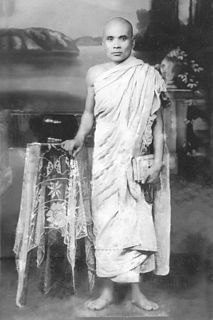
Dhammalok Mahasthavir was a Nepalese Buddhist monk who worked to revive Theravada Buddhism in Nepal in the 1930s and 1940s. For this act, he was expelled from the country by the tyrannical Rana regime.

Buddha Dharma wa Nepāl Bhāsā was the first magazine in Nepal Bhasa. It was published in 1925 from Kolkata, India by Dharmaditya Dharmacharya.

Aniruddha Mahathera was a Nepalese Buddhist monk and the Sangha Nayak (Patriarch) of Nepal from 1998 until his death in 2003. He was one of the most important figures in the revival of Theravada Buddhism in Nepal and the development of Lumbini, the Buddha's birthplace in southern Nepal, into a center of international pilgrimage.

Pokhara Shanti Stupa is a Buddhist pagoda-style monument on Anadu Hill of the former Pumdi Bhumdi Village Development Committee, in the district of Kaski, Nepal.
Lumbini Development Trust (1985) or was founded for the purposes of restoring the Lumbini Garden under the master plan of the government of Nepal. Lumbini is the traditional birthplace of Gautama Buddha, the founder of Buddhism, who was born in the 7th or 6th century BC.According to Buddhist tradition, Maya Devi gave birth to the Buddha on her way to her parents’ home in Devadaha in the month of May in the year 623 BC. Feeling the onset of labor pains, she grabbed hold of the branches of a shade tree and gave birth to Siddharta Gautama, the future Buddha. The Buddha is said to have announced, "This is my final rebirth" as he entered the world. Buddhist tradition also has it that he walked immediately after his birth and took seven steps, under each of which a lotus flower bloomed. In 249 BC, the Buddhist convert Emperor Ashoka visited Lumbini and constructed four stupas and a stone pillar. Ashoka's Pillar bears an inscription that translates as: "King Piyadasi (Ashoka), beloved of devas, in the 20 year of the coronation, himself made a royal visit, Buddha Sakyamuni having been born here, a stone railing was built and a stone pillar erected to the Bhagavan ["blessed one"] having been born here. Lumbini village was taxed reduced and entitled to the eight (8) part (only)".
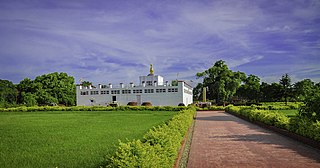
Maya Devi Temple is an ancient Buddhist temple situated at the UNESCO World Heritage Site of Lumbini, Nepal. It is the main temple at Lumbini, a site traditionally considered the birthplace of Gautama Buddha. The temple stands adjacent to a sacred pool and a sacred garden. The archaeological remains at the site were previously dated to the third-century BCE brick buildings constructed by Ashoka. A sixth-century BCE timber shrine was discovered in 2013.
Steven C. Rockefeller Jr. is an American businessman in the financial industry and is the chairman and CEO of the Rose Rock Group, a global investment management firm established by members of the Rockefeller family. Rockefeller is the son of Steven Clark Rockefeller and the grandson of former U.S. Vice President Nelson Rockefeller.

